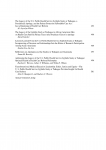Health Status and Health Behaviors of Racial and Ethnic Minority Populations: Week 1
LECTURE TOPICS:
-
Introduction to Health Disparities
-
Review of Course/Course Requirements
-
What are Health Disparities, Health Inequities, Health Equity
-
What are Social Determinants
-
OMB and Census 2000 Race/Ethnicity Designations and Behavioral Self-Identity
-
Methods in Health Disparities
REQUIRED READINGS:
What We Mean by Social Determinants of Health
Vicente Navarro, Johns Hopkins. (2009). International Journal of Health Services.39 (3), 423 – 441.
The Health Impact of Resolving Racial Disparities: an Analysis of US Mortality Data
Woolf SH, Johnson RE, Fryer GE Jr, Rust G, Satcher D. (2008). Am J Public Health. 98 (9 Suppl):S26-8.
[download PDF]
Pathways of Influence on Equity in Health
Starfield, B. (2007). Social Science & Medicine, 64, 1371-1372.
[download PDF]
Defining Equity in Health
Braveman, P. & Gruskin, S. (2003). Journal of Epidemiology and Community Health, 57(4), 254-258.
[download PDF]
Definitions of “Race”
[download PDF]
OPTIONAL READINGS:
Content and frequency of writing on diabetes bulletin boards: does race make a difference?
Case S, Jernigan V, Gardner A, Ritter P, Heaney CA, Lorig KR. (2009). J Med Internet Res.11(2),e22.
[download PDF]
Do birth cohorts matter? Age-period-cohort analyses of the obesity epidemic in the United States. Reither EN, Hauser RM, Yang Y. (2009). Soc Sci Med.69(10),1439-48.
[download PDF]
Epigenetics and The Embodiment of Race: Developmental Origins Of US Racial Disparities In Cardiovascular Health
Kuzawa CW, Sweet E. Am J Hum Biol. 2009 Jan-Feb;21(1):2-15.
[download PDF]
Comparing racial and ethnic populations based on Healthy People 2010 objectives.
Keppel K, Garcia T, Hallquist S, Ryskulova A, Agress L. Healthy People Stat Notes. 2008 Aug;(26):1-16.
[download PDF]
When Does a Difference Become a Disparity? Conceptualizing Racial and Ethnic Disparities in Health
Hebert PL, Sisk JE, Howell EA. Health Aff (Millwood). 2008 Mar-Apr;27(2):374-82.
[download PDF]
A Note From The Editor
Brennan Virginia. Medical and Mental Health Care in a Multi-Ethnic Community Sample. J Health Care Poor Underserved. 2008 Aug;19(3):894-911.
[download PDF]
Ten Largest Racial and Ethnic Health Disparitites in the United States based on Healthy People 2010 Objectives
Keppel Kenneth G. (2007) American Jounal of Epidemiology Advance Access
[download PDF]
Racial and Ethnic Health Disparities: Influences, Actors, and Policy Opportunities
Meyers, K.H.S (2007). Kaiser Pernanente Institute for Health Policy.
[download PDF]
Disparities in Health: Perspectives of a Multi-ethnic, Multi-racial America
Blendon RJ, Buhr T, Cassidy EF, Perez DJ, Hunt KA, Fleischfresser C, Benson JM, Herrmann MJ. Health Aff (Millwood). 2007 Sep-Oct;26(5):1437-47.
[download PDF]
Eight Americas: Investigating Mortality Disparities Across Races, Counties, and Race-Counties in The United States
Murray CJ, Kulkarni SC, Michaud C, Tomijima N, Bulzacchelli MT, Iandiorio TJ, Ezzati M. PLoS Med. 2006 Sep;3(9):e260. Erratum in: PLoS Med. 2006 Dec;3(12):e545.
[download PDF]
Health Disparities and Health Equity: Concepts and Measurement
Braveman Paula. (2006). Annual Review of Public Health. Vol 27: 167-194
[download PDF]
Race and Ethnicity in Public Health Research: Models to Explain Health Disparities
Dressler, W.W., Oths, K.S., & Gravlee, C.C. (2005). Annual Review of Anthropology, 34, 231-252.
[download PDF]
The Changing Landscape for the Elimination of Racial / Ethnic Health Status Disparities.
Walker B., Mays V.M., &?Warren, R. (2004). Health Care Poor Underserved, 15 (4), 506-521.
[download PDF]
Four-Year Review of the Use of Race and Ethnicity in Epidemiologic and Public Health Research
Comstock, R.D., Castillo, E.M., & Lindsay, S.P. (2004). American Journal of Epidemiology, 159, 611-619.
[download PDF]
Introduction: Seeing the Forest and the Trees ? From Observation to Experiments in Social Epidemiology
Berkman, L.F. (2004). Epidemiologic Reviews, 26, 2-6.
[download PDF]
The Social Epidemiology of Human Immunodeficiency Virus/Acquired Immunodeficiency Syndrome
Poundstone, K.E., Strathdee, S.A. & Celentano, D.D. (2004). Epidemiologic Reviews, 26, 22-35.
[download PDF]
“Bodies Count,” and Body Counts: Sociological Epidemiology and Embodying Inequality
Krieger, N. & Smith, G.D. (2004). Epidemiologic Reviews, 26, 92-103.
[download PDF]
The Study of Group-Level Factors in Epidemiology: Rethinking Variables, Study Designs, and Analytical Approaches
Roux, A.V.D. (2004) Epidemiologic Reviews, 26, 104-111.
[download PDF]
What’s Wrong with Social Epidemiology, and How Can We Make It Better?
Kaplan, G.A. (2004) Epidemiologic Reviews, 26, 124-135.
[download PDF]
The Social Epidemiology of Substance Abuse
Galea, S., Nandi, A. & Vlahov, D. (2004) Epidemiologic Reviews, 26, 26-36.
[download PDF]
Classifications of Race and Ethnicity: Implications for Public Health
Mays, V.M., Ponce, N., Washington, D.L., & Cochran, S.D. (2003). Annual Review of Public Health, 24, 83-110.
[download PDF]
Race Plays Role in New Drug Trials: Treatment by Genetic Origin, Ethnicity Divides Medical Profession
Cha, A.E. (2003). Washington Post.
[download PDF]
What is a “Health Disparity”?
Carter-Pokras, O. & Baquet, C. (2002). Public Health Reports, 117, 426-434.
[download PDF]
America’s Diversity at the Beginning of the 21st Century: Reflections from Census 2000
Singer, A. (2002). The Brookings Institution, Center on Urban and Metropolitan Policy.
[download PDF]
Mental Health: Culture, Race, and Ethnicity – A Supplement to Mental Health: A Report of the Surgeon General
U.S. Department of Health and Human Services. (2001). Rockville, MD: U.S. Department of Health and Human Services, Substance Abuse and Mental Health Services Administration, Center for Mental Health Services.
[download PDF]


